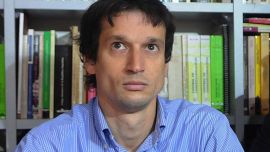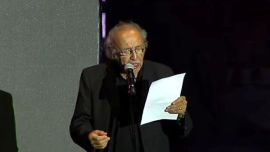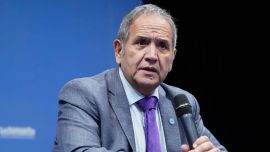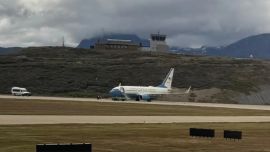Things didn’t work out as expected for Federico Sturzenegger when he became Argentina’s central bank chief.
One of the country’s most renowned economists, Sturzenegger took over the position in late 2015 with big ideas and bigger challenges: bring inflation back down to a single digit after years of price controls, non-stop money printing and fake statistics.
The mission proved harder than expected and by the time the former Harvard professor left the bank a year ago, the Argentine peso was in free fall despite a record International Monetary Fund credit line. Once again, Argentines found themselves in the middle of a currency crisis. As for inflation, it was still above 26% -- and that’s low considering the current 57% annual rate.
Sturzenegger, now a senior partner at Latus View, an investment company focusing on Fintech, looked back on the events last year that left the government of President Mauricio Macri badly shaken in his first interview since leaving the post. Looking forward, the tight monetary policy adopted by the current central bank head, Guido Sandleris, has a chance to succeed where for decades so many others failed in Argentina, Sturzenegger said.
“The disinflation process will be substantial, fast, stronger than anybody expects,” if the current monetary policy is kept in place, Sturzenegger, 53, said in New York. “You could reach the end of the year with a monthly inflation rate around 1%.”
Argentina’s consumer prices rose 3.1% in May from a month ago, the slowest pace since January and off the 2019 high of 4.7% posted in March.
Sturzenegger is convinced this time is different because the government has taken “sizable fiscal consolidation," while the financial system has finally digested a monetary shock that began last August when the bank started to drastically reduce its short-term debt, infusing cash into the economy and fuelling inflation, he said. The economy should stabilize and even be growing by the time of the presidential election in late October, before gaining speed next year, he added. Not wavering in the plan’s execution will be key, he said.
Letting the peso float freely was one of his top achievements, Sturzenegger says. It also led to his demise.
Starting in June 2017, an argument began between the central bank and Macri’s administration over the bank’s inflation goals and high interest rates. Macri’s team wanted the bank to relax its targets, which would make it easier to cut rates and boost the economy, among other objectives.
Sturzenegger lost the battle, and on Dec. 28, 2017 – seated next to cabinet chief Marcos Pena – the government announced the change in inflation targets. Markets reacted negatively, interpreting the surprise move as Macri meddling in monetary policy despite repeatedly saying the central bank was truly independent.
"Perhaps I lowered the guard a little bit at the end of 2017. I thought the economy was doing well, the disinflation process was doing well," he said. “The impact on our credibility was more like a permanent shock."
The Dec. 28 decision was the first in a series of events that sparked a currency crisis. With the peso collapsing and the Federal Reserve raising interest rates, credit markets essentially began to close for Argentina, which added pressure across the board. More arguments ensued between Sturzenegger and the government over the floating exchange rate, ultimately leading to his resignation.
"The biggest lesson of what happened is that you need to support having an independent central bank, and I think a lot of the costs paid were the result of that," Sturzenegger concluded. "I don’t see that lesson as being learned."
- Bloomberg



















Comments